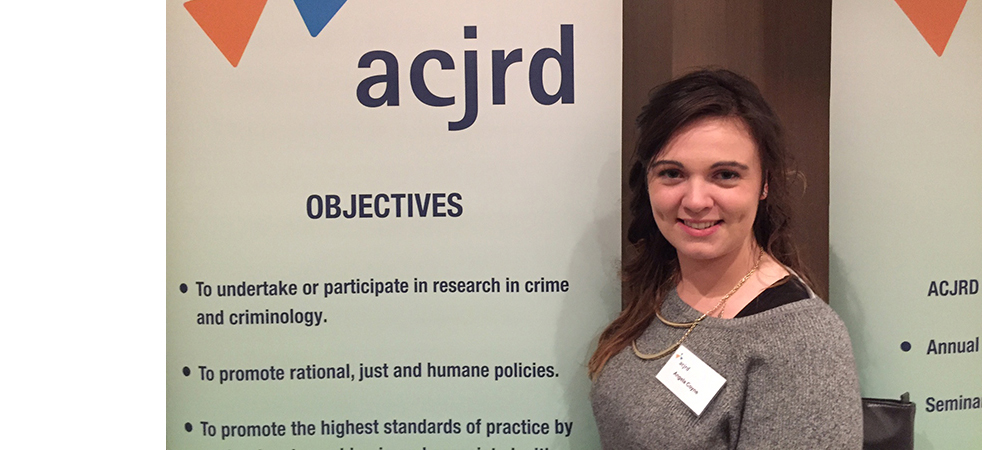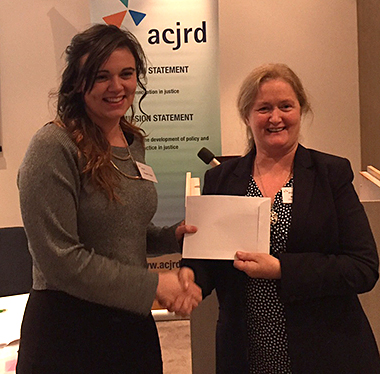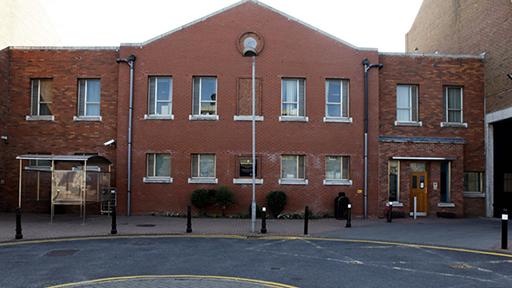Better understanding and treatment for Ireland’s female offenders

Wed, 30 Nov 2016 13:05:00 GMT
PhD researcher Angela Coyne’s work has already won her an award from the Association for Criminal Justice Research and Development
A UNIVERSITY of Huddersfield researcher hopes that her work will lead to better understanding and treatment of female offenders – in and out of prison – so that they are not locked in a downward spiral and stigmatised by society. Angela Coyne has already won an award for the first phase of her project (pictured below).
 After completing a Master’s course in Investigative Psychology at the University of Huddersfield, Angela – who is based in the West of Ireland – embarked on research for a doctorate. Her focus is on the experience of women prisoners in Ireland, although she believes that her findings will have relevance elsewhere.
After completing a Master’s course in Investigative Psychology at the University of Huddersfield, Angela – who is based in the West of Ireland – embarked on research for a doctorate. Her focus is on the experience of women prisoners in Ireland, although she believes that her findings will have relevance elsewhere.
“One of the problems comes from a lack of research into women offenders in Ireland. Their needs are very different and if you use the same solutions and remedies you won’t get the same response from males and females,” said Angela.
She points to the serious effect on family life when a woman is jailed. “And there is stigma attached once she leaves prison. It is very difficult for her to find accommodation and different kinds of help.”
The Association for Criminal Justice Research and Development (ACJRD) – based in Dublin – announced an essay contest as part of a conference titled Access to Justice and Angela realised the relevance to her own work. She submitted an essay titled Challenging the term ‘criminal justice’ when discussing the experiences of women who find themselves in the criminal justice system.
It was chosen as the winner and she received the 200 euro prize from Maura Butler, chair of ACJRD. Also, Angela’s essay is published online by the Association.
She describes and evaluates existing research and literature relevant to her theme and among her conclusions she writes that “given the current situation of women in the criminal justice system, a reappraisal of criminal justice intervention and sentencing in general is urgently required”.
 Angela’s first degree – obtained in Waterford – was in straight psychology, but she was drawn towards the criminological dimensions of the discipline and then the MSc course in Investigative Psychology at the University of Huddersfield. Its Assistant Course Director is Dr John Synnott, who is now Angela’s PhD supervisor.
Angela’s first degree – obtained in Waterford – was in straight psychology, but she was drawn towards the criminological dimensions of the discipline and then the MSc course in Investigative Psychology at the University of Huddersfield. Its Assistant Course Director is Dr John Synnott, who is now Angela’s PhD supervisor.
“Investigative Psychology is quite a new discipline relative to other forms of psychology, but it has a lot to offer, growing directly out of empirical research and logical inference to cover the full range of investigative activities,” said Angela.
Now, as her PhD progresses, she will establish links with the Ireland’s two centres for female offenders and has already held talks with the psychological service at the Dóchas Centre (pictured right) in Dublin.
After completing her doctorate, Angela’s goals include working with offenders herself.
Dr Synnott commented: “It was a huge honour for me and Angela’s co-supervisor Dr Maria Ioannou, who is Course Director of the MSc, to be able to attend the conference in Dublin to see her receiving the award. It is not every day one of your students receives an award at an International Conference and we are very proud of her achievement.”







